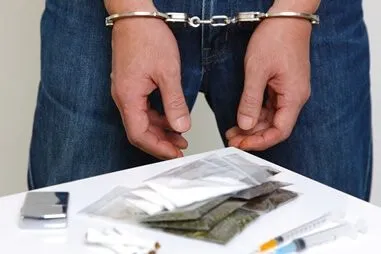There is an extremely thin line between “simple” drug possession and possession with intent to distribute in Massachusetts. The laws surrounding these charges are complicated and include lengthy jail sentences even for a first offense, so it’s vital that you have an experienceddrug possession defense lawyeron your side.
Penalties for Drug Possession With Intent to Sell in Massachusetts

Massachusetts General Law prohibits the intentional distribution, manufacture, or possession with intent to manufacture or distribute controlled substances. Since the crimes are governed by the same statute, Possession with Intent to Distribute carries the same penalties is as Drug Manufacturing.
Punishments for Possession with Intent to Distribute can vary widely depending on theclass of the controlled substancein your possession and whether you’ve faced similar charges before. For example, a first-offense conviction involving marijuana (a Class D substance) carries a jail sentence of up two years, but a first conviction of heroin possession can result in as much as 10 years in state prison.
Penalties are often higher for crimes involving:
- School zones.Drug crimes that take place within 100 feet of a park or playground, or 1000 feet of a public or private school, are seen as particularly heinous. Prosecutors can charge you with a “school zone violation” if the offense or arrest was within the 1000-foot school zone area, even if you had no intention of distributing substances within that zone. Due to the layout of cities and towns in the state, many offenses take place in close proximity to schools and parks without the offender even realizing it. If you are convicted at trial, a school zone violation could result in a mandatory minimum jail sentence.
- Class A or B substances.Heroin, cocaine, ketamine, and certain opioids carry more jail time and higher fines than lower-risk substances. In addition to incarceration, defendants may be ordered to pay fines ranging from $2,500 to a maximum of $25,000, depending on the level of the offense.
- Previous offenses.A subsequent conviction for the same crime increases penalties significantly, particularly for possession of high-risk drugs. A second charge of heroin possession with intent to distribute carries a mandatory minimum prison sentence of 5 years up to a possible 15 years, while a second-offense cocaine distribution charge carries a 3-year mandatory minimum sentence in state prison, with a possible maximum sentence of 10 years. If you are convicted under a law with a mandatory minimum sentence, you will have to serve at least the minimum jail or prison time required under the law.
For a free legal consultation, call (781) 740-0800
Does the Amount of Drugs in my Possession Matter in a Distribution Case?
Unlike in drug trafficking cases, the amount of an illegal substance in your possession doesn’t matter in an Intent to Distribute charge. You could potentially be charged with this offense if police find even the slightest evidence of an intent to sell a controlled substance. In some cases, the presence of drug sales paraphernalia such as baggies, small scales, needles, or rolling papers can lead to a charge of Intent to Distribute.
Even if you were found with drugs or drug paraphernalia in your possession, it doesn’t mean you had any intention of giving or selling it to others. Since Intent to Distribute carries higher penalties than simple possession, it’s important that your attorney knows how to refute additional charges based on circumstantial evidence.
For example, if police find three marijuana plants on your property, you cannot be convicted of Possession with Intent to Distribute unless the prosecutor can prove that you knew about the plants, you had direct control over the plants, and that the plants weren’t intended purely for personal use.
The strength of your case will also depend on whether the evidence against you was obtained legally. If you were arrested after an unlawful traffic stop, were subject to an illegal search, or were questioned without an attorney present, we can make a motion to suppress evidence gathered in violation of your rights.
If you or someone you know is facing drug charges, you need help from someone with a proven track record of success. Nate Amendola Defense exclusively handles criminal cases, and offers a free initial case review so you know where you stand.Contact ustoday to begin building a personalized, aggressive defense.
Call or text (781) 740-0800 or complete a Free Case Evaluation form


